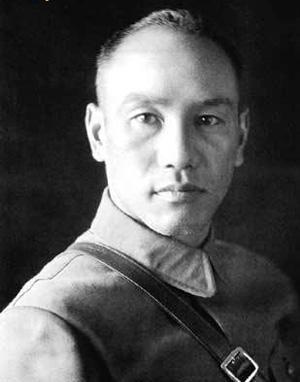What is history: it is the echo of the past to the future, the reflection of the future on the past. - Hugo
The War of Liberation, also known as the Third Civil Revolutionary War, was a battle fought between the Kuomintang and the Communists after the victory of the War of Resistance. The battle officially began in August 1945 and ended in September 1949, when the old Chiang fled, leaving only a few remnants that could not be extinguished.
In just four years, Chiang Kai-shek lost a million troops, but in these four years, the Nationalist army under his command fought countless battles with our Party, and in each of these battles basically ended in the victory of our army, causing Chiang Kai-shek to fall to the bottom of the abyss and never get up again. So you know what? The Three Major Battles of the War of Liberation, which led to Chiang Kai-shek's complete defeat, were they the three major battles? And who are the commanders of both sides?

Chiang Kai-shek
The first must have been the Liaoshen Campaign, so why is it said that the Liaoshen Campaign was one of the three major battles that made Chiang Kai-shek completely defeated? Let's first take a look at where the Liaoshen Campaign took place.
This war took place in the three northeastern provinces of our country, the three northeastern provinces were the large industrial cities at that time, you must know that this place has been operated by the Beiyang warlord Zhang Zuolin, and finally let Japan establish Manchukuo, although these years have been fighting, but the northeast is operated by them as a large rear, you must know that in the eight-year War of Resistance, the northeast was lost at the hands of Zhang Xueliang, there were no major battles, the big battles were basically in Guannei, so during this period, the northeast has been very well developed, whether it is agriculture or industry, They were all relatively developed cities at that time. That's why! After the victory of the War of Resistance, both the Kuomintang and the Communists desperately tried to seize the northeast.
In order to compete for the northeast, the enemy and us finally launched a life-and-death showdown in the northeast region on September 12, 1948, in order to get the fat meat of the three eastern provinces, at that time our army invested 700,000 troops, and Chiang Kai-shek also invested 550,000 troops, including the most powerful New First Army, the New Sixth Army, the 52nd Army, which were all all American equipment, and let Wei Lihuang (one of Chiang Kai-shek's five tiger generals) serve as the supreme commander of this battle, in addition to Du Yuming, Zheng Dongguo, Liao Yaoxiang, Fan Hanjie, These are all first-class and first-class celebrities at home and abroad. The Northeast Field Army was commanded by the military genius Lin Shuai, as well as Luo Shuai, Liu Yalou, Cheng Zihua, Xiao Jinguang and others.
Fan Hanjie
However, the 52-day Liaoshen Campaign ended in Chiang Kai-shek's great defeat, which caused Chiang Kai-shek to completely lose the northeast and lose this important rear area. The Northeast Field Army has developed rapidly due to the occupation of all the northeast troops, from 700,000 before the war to a million troops, and has also received countless weapons and ammunition.
The second battle is the Battle of Huaihai, the place where this battle took place was Xuzhou, Shangqiu, Suxian and other cities, there is a saying that said well, those who win the Central Plains will win the world, and Xuzhou has always been a place where soldiers must fight, and the position of combat strength is very important. To this end, Chiang Kai-shek invested 800,000 troops to win the war.
However, he still failed, in addition to the improper use of personnel, there was also a discord between the generals, in this battle Bai Chongxi did not listen to the dispatches, Fu Zuoyi refused to go south, and Chiang Kai-shek made Liu Zhi the supreme commander of the Huaihai Campaign.
In this battle, the supreme commanders of our army were Liu Shuai, Commander Su, Laozong Chen, and Deng Gong, all of whom were famous generals who had experienced hundreds of battles, and it was strange that Chiang Kai-shek was undefeated. The defeat of this battle made Chiang Kai-shek lose the initiative, and he was no longer able to confront our army, and the rest of the time could only be defended.
Commander Millet
The third battle was the Battle of Crossing the Yangtze River, a million troops crossed the Yangtze River, which is the Battle of Crossing the Yangtze River, and the supreme commander of our army was Liu Shuai and Commander Su, and the supreme commander of the Nationalist army, Tang Enbo, in fact, at that time Chiang Kai-shek was very confident of defending the world south of the Yangtze River, and built the Yangtze River defense line and also invested 700,000 troops to block the pace of our army's attack.
However, in less than two months, the Yangtze River defense line completely collapsed, and the defeat of this battle made Chiang Kai-shek a homeless and fleeing king, and from then on, he was no longer able to confront our army and could only escape. Soon after, our army quickly liberated Shanghai and Nanjing, and then led the army south to liberate Jiangsu and Zhejiang, while Chiang Kai-shek fled to the southwest, and finally fled to an isolated island, never to return.
The Liaoshen Campaign deprived Chiang Kai-shek of the best strategic rear base, the Battle of Huaihai deprived Chiang Kai-shek of the initiative and changed from attack to defense, and the Battle of crossing the River left Chiang Kai-shek homeless and became a prince in exile, so these three battles were the three major battles that made Chiang Kai-shek completely defeated in the War of Liberation.